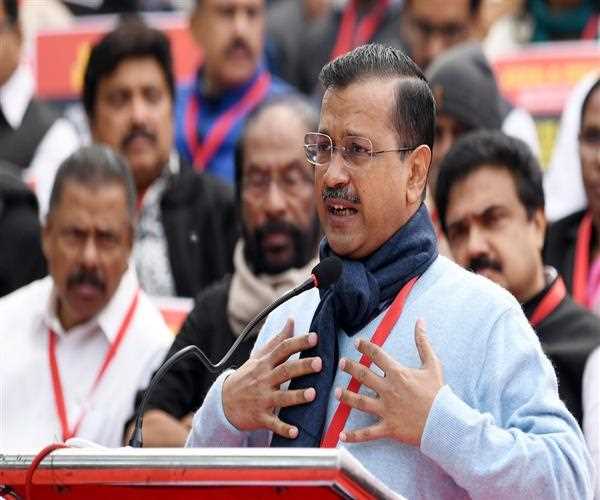
21-Feb-2024 , Updated on 2/21/2024 9:22:01 PM
Why Arvind Kejriwal skips ED summons? Politics of AAP
The Chief Minister of Delhi and the face of Aam Aadmi Party, Arvind Kejriwal is once again in the middle of a very big controversy by not appearing before the Enforcement Directorate (ED) in the matter of a suspected money laundering case. This blog explores the issue further and focuses on the causes behind Kejriwal's actions.
Defiance of Legal Authority
Kejriwal’s defiance of the ED’s calls has made major concerns arise about his compliance with Indian law and the independent functions of law courts. Due to Kejriwal's public position and his holding of an important office, he is required to set an example and cooperate with the legal process. Nevertheless, his refusal to take note of the summonses weakens the key democratic values that are imperative for the working of democracy.
Kejriwal's supporters contend that the ED summons are politically motivated and part of a grand conspiracy to hang the net on him and his party. The AAP believes that Kejriwal is being unfairly targeted due to his bold sense of resistance against the central government and his struggling voice for the rights of the common man. They interpret his decision not to report to the ED as a defiant stance against persecution of the opposition and an affirmation of the rights of the lawfully elected representative.
Political Calculations and Strategy
The critics take Kejriwal's actions are motivated by a political agenda instead of bona fide legal problems. They say this tactic Kejriwal, pitches for his political constituency and brings commiseration from the public. The opposition regards his resistance to be a ploy to shift the blame on his legal charges and to appear to be an anti-establishment activist.
Also, Kejriwal's opponents call him out for exploiting the whole ED summons issue as a diversion from the flaws and failures of the government. In the view of his critics, such an approach makes him fight his legal battles to draw attention away from issues such as governance, public services, and infrastructure development where his government has attracted criticism.
Allegations of Compromise and Collusion
Mr. Kejriwal's earlier associations with individuals and groups accused of corruption and other offenses have sometimes been questioned. Critics suggest that his readiness to ally himself with controversial figures with whom he shares a political agenda is a clear indication of questionable character and an untrustworthy source of ethical leadership. In this case, the opponents argue that by trying to tap those with questionable backgrounds, Kejriwal risks losing the credibility the party is fighting for and destroying its image as a clean party.
Another of Kejriwal's opponents brings up instances where he allegedly made compromises to achieve political success. They say the examples of AAP’s leaders and its members being charged with corruption, or accused of wrongdoing bring doubt on the party’s commitment to its founding values of transparency and integrity.
Prioritizing Political Expediency over Legal Obligations
Kejriwal's choice of politics instead of law is very disturbing since it means that he would be more interested in serving himself rather than the public. Kejriwal's defiance of the law by denying appearance in summons and claiming that his actions are politically motivated ushers in an era of instability within the democratic framework by compromising the prestige of democratic institutions and the trust that the public has in elected officials. The fact that he tolerates the existence of such a system also indicates a lack of commitment to those principles that are needed for proper governance.
Critics say that Kejriwal’s refusal to cooperate with ED’s investigation must be condemned and stands as a bad example. They charge that by disobeying the legal procedures, Kejriwal weakens the basis of the law and rule of law in the country. They point out that no one, irrespective of their political stance, should be above the law, and condemn actions of Kejriwal that undermine the very institutions they sought to protect.
Manipulation of Electoral Dynamics
Critics stigmatize Kejriwal as a person who manipulates the situation and creates division by using the support of groups with doubtful reputations to gain electoral success. The association between Kejriwal and people and groups accused of corruption and criminal cases could be a source of alienation to voters who value honesty and integrity. His eagerness to sacrifice ethical principles for short-term politics leads to the lack of belief in AAP about clean politics.
The critics also talk about occasions when Kejriwal and AAP have been charged with collaboratively dealing with political parties and individuals who have doubtful reputations. Such people or other unsavory characters act as the main argument that when Kejriwal chooses to elicit support from something tainted, AAP’s image of a party that stands for clean governance and ethics gets compromised. They argue that the alliances will, therefore, damage the autonomy of the party and gradually erode public confidence in the leaders.
Conclusion
The debate surrounding Arvind Kejriwal's absence in the ED summonses again reveals that this country has complex interactions between politics and the legal system. Kejriwal's actions invite debate on whether he is worthy of trust in upholding the rule of law and whether he is willing to cooperate with the legal system. While stepping through these hurdles, AAP must focus on maintaining transparency, accountability, and ethical conduct that will preserve the trust in the party and fulfill its role (mandate) of clean and efficient governance.

Content writer
I am a content writter !
Join Our Newsletter
Subscribe to our newsletter to receive emails about new views posts, releases and updates.
Copyright 2010 - 2026 MindStick Software Pvt. Ltd. All Rights Reserved Privacy Policy | Terms & Conditions | Cookie Policy